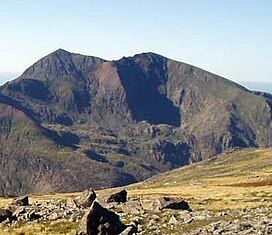Garnedd Ugain
| Garnedd Ugain | |
|---|---|
 Garnedd Ugain (right) and Snowdon (left) | |
| Highest point | |
| Elevation | 1,065 m (3,494 ft) |
| Prominence | 72 m (236 ft) |
| Parent peak | Snowdon |
| Listing | Hewitt, Welsh 3000s, Nuttall, Furth |
| Naming | |
| English translation | Cairn of the Twenty |
| Language of name | Welsh |
| Pronunciation | Welsh: [ˈɡarnɛð ˈiːɡai̯n] |
| Geography | |
 | |
| Location | Gwynedd, Wales |
| Parent range | Snowdonia |
| OS grid | SH610551 |
| Topo map | OS Landranger 115 |
| Name | Grid ref | Height | Status |
|---|---|---|---|
| Llechog | 718 m (2,356 ft) | sub Hewitt, Nuttall |
Garnedd Ugain, also known as Crib-y-Ddysgl, is a pyramidal mountain in Wales that forms part of the Snowdon Massif. It is the second-highest peak in Wales, (Although with a far greater topographical prominence Carnedd Llywelyn is usually considered second highest). and lies just under one kilometre north of the summit of Snowdon itself.
It is part of the Snowdon Horseshoe route,[1] being linked to Crib Goch via the col at Bwlch Coch, and to Snowdon summit via the col at Bwlch Glas. It is also linked to Cwm Glas to the northeast via a steep arete called Clogwyn y Person, which joins the main Crib y Ddysgl ridge about 500 metres (1,600 feet) east of the summit.
Name
[edit]Both Garnedd Ugain and Crib-y-Ddysgl appear on the Ordnance Survey's maps of the area. The name Crib-y-Ddysgl refers to the east ridge [2] whilst the summit is Garnedd or Carnedd Ugain.
Crib-y-Ddysgl (meaning "ridge of the dish" in Welsh) is the name used by Alan Dawson for the peak's listing as a Hewitt.
Carnedd Ugain in Welsh means "Cairn of the Twenty" (the form Garnedd is the result of soft mutation). This was possibly named after the Roman legion based in Caernarfon[citation needed].
The web pages of the Welsh Mountaineering Club suggest that the name could also be a corruption of "Carnedd Wgon", and so named after the prince Wgon sung of by Dafydd ap Gwilym or possibly after the 13th-century poet Gwgon Brydydd.[3]
References
[edit]- ^ "How to scramble: Crib Goch". www.thebmc.co.uk.
- ^ Steve Ashton (1992). Scrambles in Snowdonia. Cicerone Press. ISBN 1-85284-088-9.
- ^ See [1] Archived 2011-07-08 at the Wayback Machine. (NB "Gwgon" becomes "Wgon" under soft mutation.)
53°04′30″N 4°04′35″W / 53.07499°N 4.07633°W
